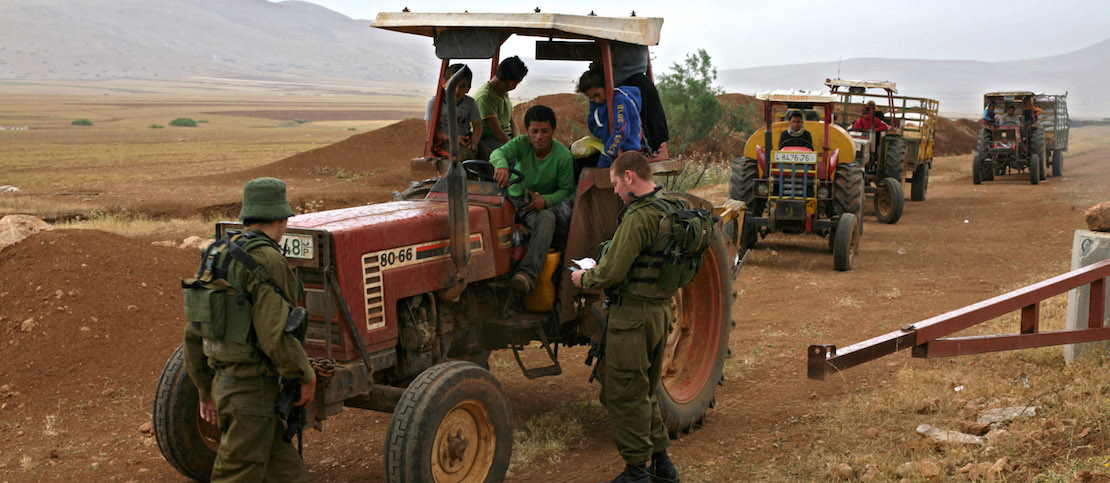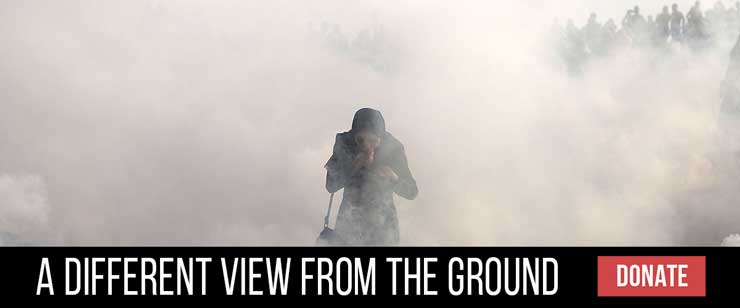What does it feel like to be a target? Jewish-Israeli dissidents and anti-occupation activists have, for the most part, been lucky enough to avoid that question over the years. While Israeli authorities have had few qualms clamping down on Palestinians who openly challenge Israel’s military dictatorship in the occupied territories, Israeli Jews have largely been spared their wrath.
That’s beginning to change. From Shin Bet interrogations at the border to coordinated attacks on prominent anti-occupation activists to the delegitimization of left-wing NGOs, authorities have been making life increasingly difficult for outspoken Jewish Israelis. For more well-known activists, the ad hominem attacks are worn like a badge of honor: proof that laying bare the cruelties of occupation is actually doing something.
Then there are activists like Guy Hirschfeld, who stand little to gain from becoming a target. Over the past few months, it has felt at times like Hirschfeld, 49, is Public Enemy No. 1 for Israeli authorities in the West Bank — and particularly the settlers. A long-time member of Ta’ayush — an Israeli-Palestinian volunteer grassroots group founded during the Second Intifada, and one of the few groups of Israelis that regularly puts their bodies on the line in solidarity with Palestinians — Hirschfeld spends most of his days accompanying Palestinian shepherds in the Jordan Valley, where they regularly come under attack by settlers or the army.
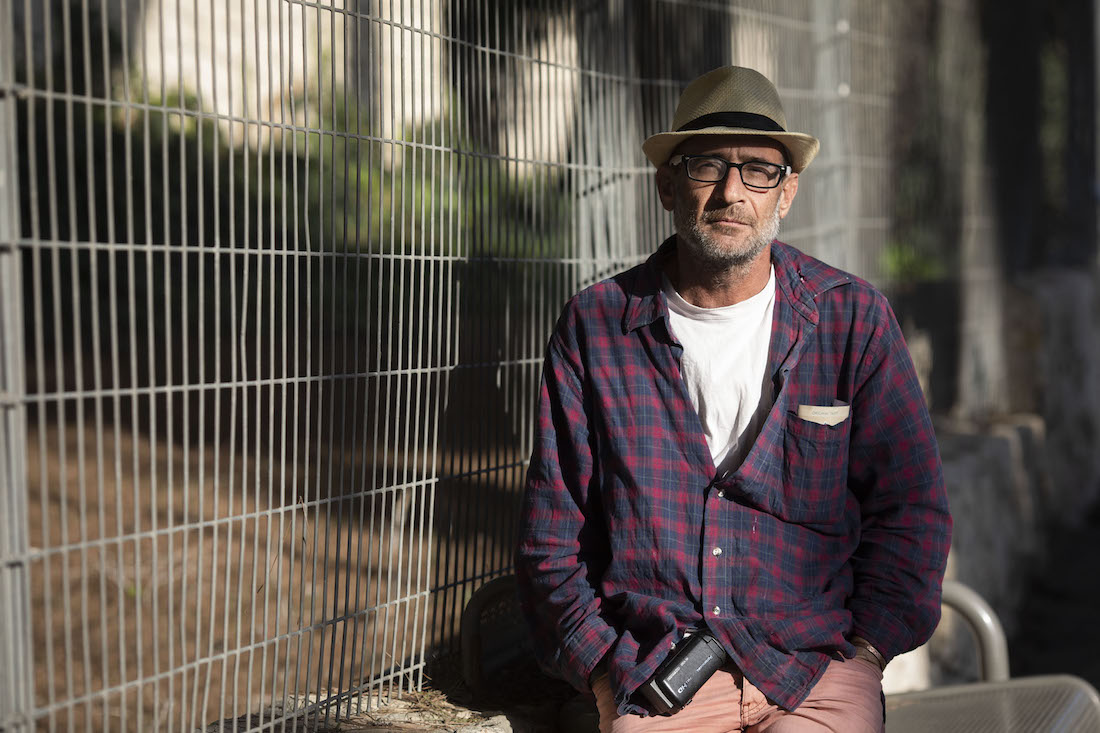
If Hirschfeld’s ideological leanings have made him a target, his brazen, often shocking style does him no favors. His routine chastising of soldiers, in which he often resorts to personal insults, coupled with a defiant irreverence for conventional norms (he commonly refers to the ideological settlers in outposts as “terrorists”) have landed him in the crosshairs. Since joining Ta’ayush in 2009, Hirschfeld has been arrested or detained between 60-70 times — 25 of them this year alone.
Hirschfeld is an easy target, but his case is exemplary of a larger clampdown on grassroots Israeli activists who struggle alongside Palestinians in the occupied territories. That clampdown was on display two years ago when a far-right group tried to bring down Ta’ayush veteran and Hirschfeld’s mentor, Ezra Nawi. Today, now that Nawi is significantly less active, Hirschfeld has become the primary target of the right.
Rather than deter him, the intimidation tactics have only made Hirschfeld more outspoken. His Facebook following has blossomed over the past two years to over 4,000, including some of the Israeli soldiers and police officers who face off against him in the arid hills of the Jordan Valley. He carefully documents every single one of his interactions with the authorities and settlers, and apart from three marijuana-related arrests (Hirschfeld is authorized to use medicinal cannabis), his persistent video-taping has meant that prosecutors have never charged him with a crime. It’s also an effective way to expose the world to what is happening to Palestinians in the northern West Bank.
In the past few months, the authorities have begun harassing Hirschfeld in new ways, and more frequently. Last month officers revoked his driver’s license and seized his car for marijuana possession (a judge returned his license and car and rebuked the police for targeting him purely because of his political views). Some weeks before that, Hirschfeld received a threatening phone call from a detective because he had urged security forces not to partake in the demolition of Khan al-Ahmar. In early December, he was forced to publicly apologize after a video surfaced of him berating an Ethiopian-Israeli soldier, toward whom he was accused of making racist remarks.
“I want to air everything out,” Hirschfeld said last week during an interview in his apartment, located in a moshav just west of Jerusalem. “The army is lying. I’m speaking the truth. If it were the inverse, I would have been sent to jail long ago. That’s why they need to get creative and find ways to stop me.”
The army and the settlers call you a criminal and an anarchist.
“And yet I’m still walking around free. How is that possible? You have no idea how many times I have been falsely arrested by soldiers or police officers. In the interrogations I show them video evidence that contradicts the reason for the arrests — and they let me go.”
“This leads some soldiers to start asking questions. When they do — that’s the last time I see them. The army makes sure there is no interaction between us from that moment on. They don’t want them to ask questions.”
Hirschfeld says he has nothing to hide. On the contrary: the more transparent he is, the less he says he has to worry about. “I believe in law and order. That’s why I always make sure not to break any laws. It infuriates the army.”
You’re not afraid you’ll be the next Ezra Nawi?
“That’s their goal. In their eyes, I am the new Ezra.”
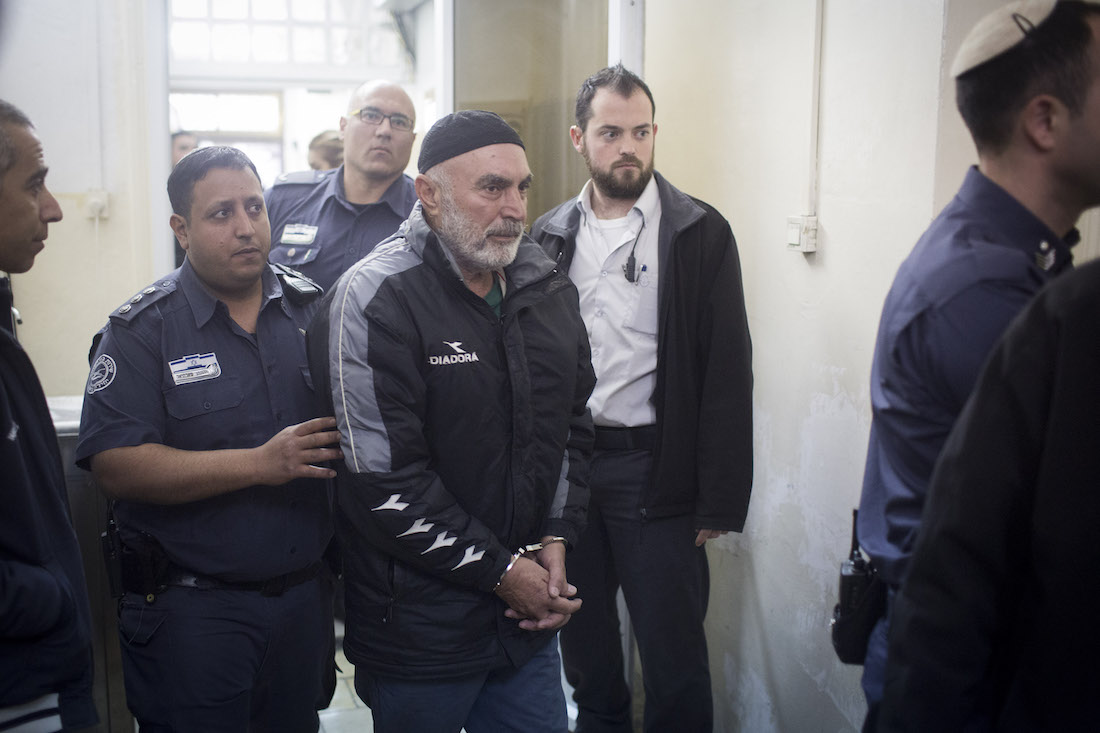
Hirschfeld believes it is his relationship with local Palestinians in the Jordan Valley as well as his brash style that infuriates soldiers and police officers. Talking to him for long enough, you get the sense that solidarity with Palestinians is only one of his goals. The amount of time he spends talking to — or yelling at — members of the Israeli security forces conveys a different message: he wants to try and educate them. “’I tell the soldiers the truth to their faces, that they are being exploited and screwed over. The truth hurts.”
It was the interaction with the Ethiopian soldier earlier this month that made Hirschfeld conclude that a change of style might be in order. In the video, Hirschfeld is seen taunting the soldier who was on duty in the West Bank, asking him rhetorically whether he was taking out his anger on Palestinians because of the racism he faces in Israel. “That experience taught me that I need to be very careful about how I express myself, but the vast majority of soldiers who carry out the day to day of the occupation do not come from the highest levels of society,” he says.
You cross the line sometimes, maybe that’s what angers so many people.
“I apologized for what I said, but I want to make one thing clear: this is the reality in Israel. I am not the one who is implementing racist policies against Ethiopians here.”
“I want to continue to show these soldiers that they are being used by a system that doesn’t care about them. The reality is that these soldiers are puppets of the radical settlers in the outposts, who are nothing less than terrorists,” he adds. “Their form of terrorism doesn’t have to be violent; their very presence is enough to frighten Palestinians. Once we show up, the settlers are more likely to move aside.”
The Jordan Valley is often overlooked in public conversations about the fate of the occupied territories. Most Israelis are not even aware that the area is under military rule — likely the result of the fact that it is sparsely populated, has a relatively small number of settlers, and the insistence, among Zionist politicians on both sides of the political map, that Israel will never relinquish security control of it.
Hirschfeld believes that presence of Israeli human rights activists in the Jordan Valley is no less important than in the south Hebron Hills, where Ta’ayush has been active since the early 2000s. In 2016, after years of accompanying Palestinians there, he decided that the group needed a presence in the Jordan Valley, an area he says is undergoing ethnic cleansing.
“During and after the 1967 War, Israel expelled tens of thousands of Palestinians from the area,” he says. “Today, Israel is trying to make life unbearable for the people who stayed behind — to cause them to leave.”
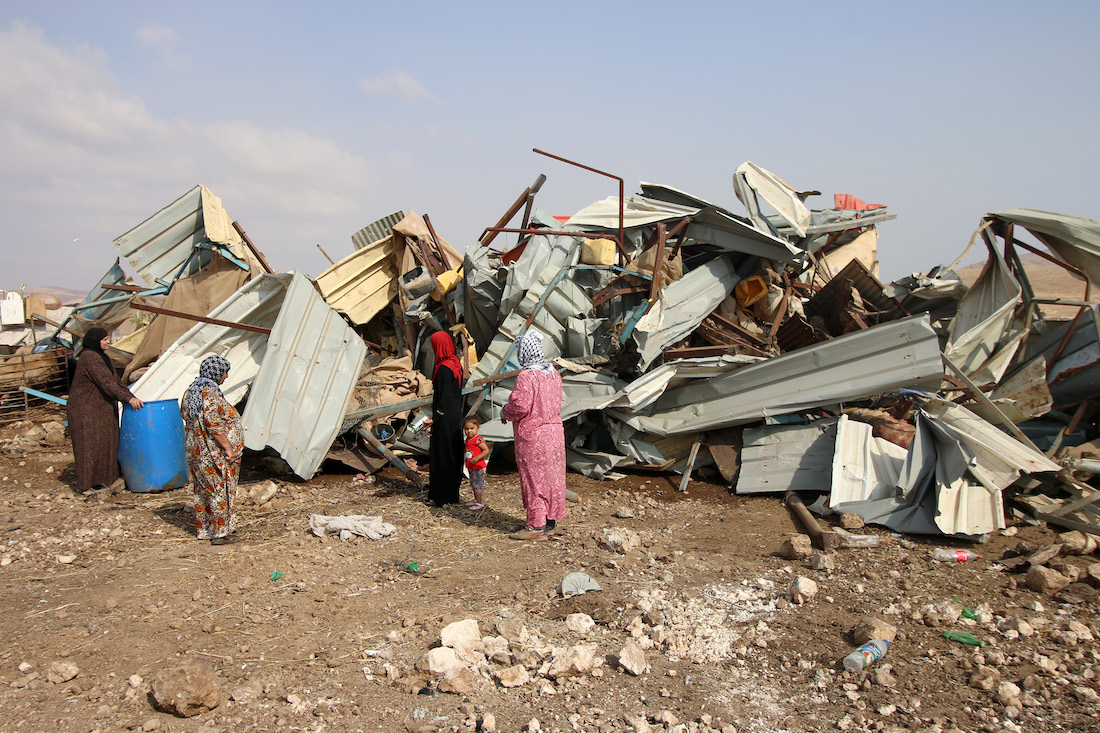
The Israeli army regularly demolishes Palestinian herding communities’ homes and other structures. Like elsewhere in parts of the West Bank designated as Area C, under full Israeli military control, it is virtually impossible for Palestinians to get building permits. The army has declared huge swaths of land “live-fire zones,” and thus off limits to shepherds. Palestinians lack basic infrastructure like running water and electricity, while nearby settlements are hooked up to all the basic amenities. The Palestinian residents face arbitrary arrests and their equipment is often confiscated.
“They’ll do anything to make them leave. We are simply trying to help these communities survive.”
How do you do that?
“We accompany them to their land, connect them with international and human rights organizations. We make sure the army or the settlers do not interfere with their herding. We document everything. We want to show them that there are other Israelis.”
“There are also more acute cases. For instance, there have been instances in which the army demands these communities clear out so they can train. Sometimes they do it without giving due notice. Once the Israeli activists show up, everything stops. You need to remember that the occupation is a criminal enterprise; the moment you shed light on it, the authorities have a much harder time dealing with it.”
Despite his outrage at security forces, Hirschfeld knows that often the only way to ensure Palestinian communities can safely herd sometimes means cooperating with the Israeli army. “Not long ago I got a call from a battalion commander who told me, ‘You’re driving my soldiers crazy. Let’s meet and talk.’ So we met, and after that there was relative quiet for a few months, at least until a new division commander was brought in.”
Palestinians who work with Ta’ayush often find that they face more pressure by the Israeli authorities. How do you navigate that?
“We never reach out to the communities themselves. They come to us after the army, police, or settlers start harassing them. It begins with a few introductory conversations in which I tell them that the authorities will try to persuade them not to work with us, especially in the beginning. I tell them to tell the army: ‘We would be happy not to have [Ta’ayush] come, but we need a place to herd.’ We tell them that if they can overcome those first few weeks, the harassment stops. Sometimes they ask us to stop coming. Sometimes they persevere and actually have a chance of winning. Right now we’re facing a situation in which things are getting worse.”
Do the attacks and the pressure come mostly from settlers or from the authorities?
“It’s a combination. Recently we have been seeing [more] collaboration between the settlers, the army, and the police. In the past year it has gotten significantly worse.”
Israeli settlements in the Jordan Valley stretch back to the 1970s but recently there are more rogue outposts populated by younger, more radical settlers.
“There are currently around 6,000 Israelis living in the Jordan Valley, most of them in settlements built in 1970s. The government wants to encourage people to move there to bring number up to 10,000.”
“We don’t know who backs these outposts (illegal even under Israeli law) financially, but it is clear that it takes thousands upon thousands of shekels to keep them afloat, and some of that money likely comes from Israeli taxpayers. They are very strategic about choosing the location of the outpost, because they know that wherever they decide to settle, it will affect the Palestinian communities around them.”
You call them terrorists. Why do you choose that term?
“They prevent shepherds from herding. They use violence, they murder livestock. They are terrorists and the army protects them. We have been monitoring those outposts from the day they were established.”
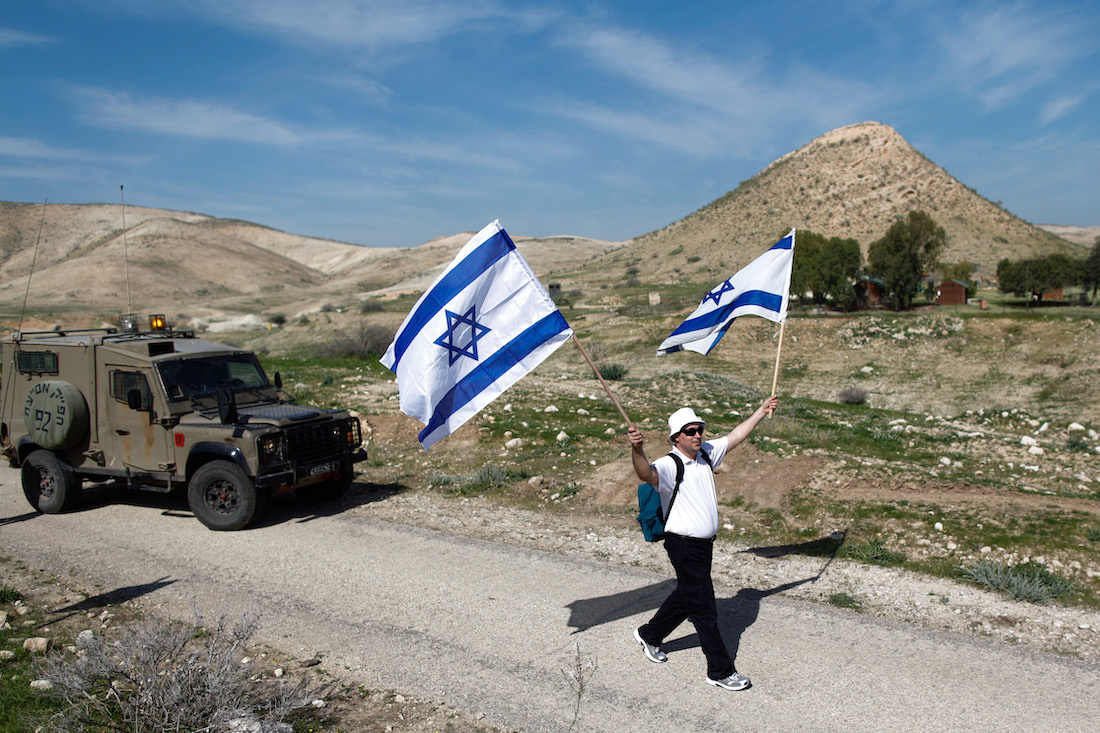
Ta’ayush has remained loyal to a classic model of grassroots organizing. What is it that has allowed the group to stay active for so many years?
“Dedication, belief in the righteousness of our path, and the fact that we’re all messed up in the head [laughs]. We’re a few dozen people who have been active in the South Hebron Hills and now the Jordan Valley. We work within the confines of the law, and we are determined to help protect people who need our help. If the Palestinians need us, we drop everything and go.”
Do you feel like you are able to explain the reality you see in the West Bank to average Israelis?
“I no longer have any desire to speak to Israelis. They don’t want to hear what I have to say. They don’t want to see it.”
Why?
“They don’t have the ability to come to terms with reality. Israelis aren’t going to end the occupation. We will likely have to face boycotts and international pressure to make this end. It’s a herd mentality in this country and the only way to end it is through outside pressure.”
Are things getting worse for left-wing activists?
“Absolutely. Today the ideological settlers have taken over the IDF’s officer’s corps, they are taking over the police. They’re the ones running the show today, their ideology is the law of the land.”

